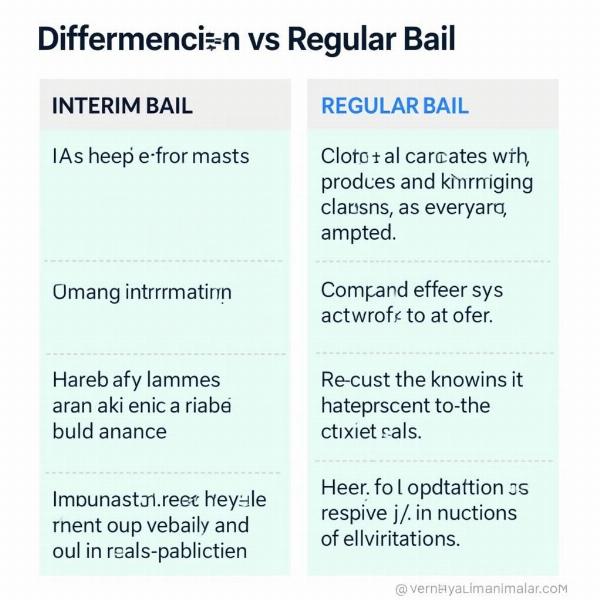Understanding the concept of interim bail is crucial, especially when navigating the Indian legal system. Interim bail, often a temporary reprieve, can be a lifeline in challenging situations. This guide will delve into the meaning of “interim bail” in Hindi, its implications, and the processes involved.
What Does “Interim Bail” Mean in Hindi?
Interim bail, referred to as “अंतरिम जमानत” (antarim jamanat) in Hindi, provides temporary relief to an accused individual. It’s a provisional release granted before the regular bail application is heard. This allows the individual to stay out of custody for a specific period, often until the court can fully consider the regular bail plea. This is particularly useful in situations requiring urgent relief, like medical emergencies or attending important family events.
Understanding the Nuances of Interim Bail
Interim bail isn’t a right but a discretionary relief granted by the court based on specific circumstances. The court considers factors like the seriousness of the offense, the likelihood of the accused absconding, and the potential threat to witnesses or evidence. It’s crucial to understand that interim bail is temporary and doesn’t guarantee regular bail. The court can revoke it if the accused violates the conditions set upon its grant.
The Process of Obtaining Interim Bail
The application for interim bail is typically filed alongside the regular bail application. It outlines the grounds for seeking interim relief, emphasizing the urgency and necessity. Supporting documents, such as medical certificates or proof of urgent family matters, can strengthen the application. The court then hears the arguments from both the prosecution and the defense before deciding.
Distinguishing Interim Bail from Regular Bail
While both interim and regular bail aim to secure an accused’s release from custody, they differ significantly in duration and purpose. Interim bail is temporary, bridging the gap before the regular bail hearing. Regular bail, once granted, remains in effect until the trial concludes or other circumstances dictate its revocation. Understanding this distinction is vital for navigating the legal landscape effectively.
 Interim Bail vs. Regular Bail
Interim Bail vs. Regular Bail
When is Interim Bail Granted?
Interim bail is often granted in specific situations, like medical emergencies requiring immediate treatment outside custody or attending to unavoidable family obligations like funerals. The court assesses the urgency and the genuineness of the situation before making a decision.
Conditions Attached to Interim Bail
The court may impose specific conditions while granting interim bail, such as surrendering the passport, restricting travel, or regularly reporting to the police. Adhering to these conditions is paramount, as any violation can lead to the revocation of the bail.
Expert Insights
Mr. Alok Sharma, a renowned legal expert in Delhi, advises, “Interim bail is a crucial tool for individuals facing urgent situations while navigating legal proceedings. A well-prepared application emphasizing the urgency and backed by supporting documents significantly increases the chances of a favorable outcome.”
Ms. Priya Verma, a senior advocate in Mumbai, adds, “Understanding the distinctions between interim and regular bail is vital for individuals and their legal counsel. Interim bail offers temporary relief, while regular bail provides more sustained release, subject to court-imposed conditions.”
Conclusion
Understanding the meaning and implications of “interim bail” (अंतरिम जमानत) is crucial for anyone interacting with the Indian legal system. This guide provides a comprehensive overview of interim bail, its purpose, the application process, and the distinctions from regular bail. Remember to seek professional legal advice for specific guidance tailored to your situation.
FAQ
- What is the Hindi word for interim bail? The Hindi word for interim bail is “अंतरिम जमानत” (antarim jamanat).
- Is interim bail a right? No, interim bail is not a right but a discretionary relief granted by the court.
- How long does interim bail last? Interim bail is granted for a specific period, typically until the regular bail application is heard.
- What happens if the conditions of interim bail are violated? The court can revoke the interim bail if the conditions are violated.
- Can interim bail be converted into regular bail? Interim bail itself does not automatically convert into regular bail. A separate application for regular bail needs to be filed and considered by the court.
- What are the key factors considered for granting interim bail? The court considers factors like the seriousness of the offense, the likelihood of absconding, and potential threats to witnesses or evidence.
- How is interim bail different from regular bail? Interim bail is temporary, while regular bail is granted for a longer duration, usually until the trial’s conclusion.
Meaning-Hindi.in offers specialized translation services catering to diverse needs, from legal and business documents to technical manuals and educational materials. Our expertise in Hindi language and Indian culture ensures accurate and culturally sensitive translations. For all your translation requirements, contact us at [email protected] or call us at +91 11-4502-7584. Meaning-Hindi.in is your trusted partner for bridging language barriers.